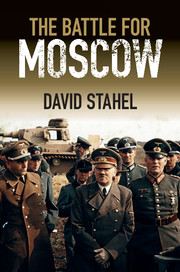Book contents
- Frontmatter
- Contents
- List of illustrations
- List of maps
- List of table
- Acknowledgements
- Glossary
- Tables of military ranks and army structures
- Introduction
- 1 Parallel wars
- 2 The idle Typhoon
- 3 Preparing the final showdown
- 4 The Orsha conference
- 5 Typhoon re-launched
- 6 The long road to Moscow
- 7 Victory at any price
- 8 The frozen offensive
- 9 Down to the wire
- 10 To the gates of Moscow
- Conclusion
- Notes
- Bibliography
- Index
6 - The long road to Moscow
Published online by Cambridge University Press: 05 February 2015
- Frontmatter
- Contents
- List of illustrations
- List of maps
- List of table
- Acknowledgements
- Glossary
- Tables of military ranks and army structures
- Introduction
- 1 Parallel wars
- 2 The idle Typhoon
- 3 Preparing the final showdown
- 4 The Orsha conference
- 5 Typhoon re-launched
- 6 The long road to Moscow
- 7 Victory at any price
- 8 The frozen offensive
- 9 Down to the wire
- 10 To the gates of Moscow
- Conclusion
- Notes
- Bibliography
- Index
Summary
Feeding the Bear: British and American aid for the battle of Moscow
While the German armies in the Soviet Union were over-extended, under-resourced and fighting their own exhaustion as much as the Red Army, Rommel’s small force in North Africa was about to suffer its most serious reversal to date. With an active strength of less than 40,000 men, (in addition to his Italian allies) Rommel’s Afrikakorps was taken by surprise when General Claude Auchinleck launched his ‘Crusader’ offensive on 18 November. Rommel was already at a distinct disadvantage with just 249 tanks (seventy of which were the obsolete Mark iis) in his two panzer divisions (15th and 21st) against some 770 British and American tanks. Moreover, the British enjoyed vastly better logistical and aerial support (some 550 serviceable aircraft to the Luftwaffe’s seventy-six), giving Auchinleck a formidable advantage. As one of Rommel’s staff officers wrote on 23 November: ‘The question is: “to be or not to be” for the Deutsches Afrika Korps.’
No such questions were being asked on the eastern front, but Rommel’s surprise at being caught unawares by an enemy offensive was paralleled by the fact that no one in Army Group Centre’s command or the OKH had any idea that Stalin was withholding large numbers of reserves for an offensive of his own. Certainly, the Soviet counteroffensive, which was to hit Army Group Centre in early December, was a long way from the carefully timed counterstroke of Soviet mythology. Zhukov had already been forced into launching local offensives in early and mid-November, which were largely premature and gained little ground, but they did grind down parts of the Fourth Army and deeply impacted upon the confidence of senior German officers, not least Kluge. If regimental- and divisional-sized Soviet attacks could induce such results, then Zhukov was correct to argue for the concentrated use of whole Soviet armies. Since early October, in the strictest secrecy, the Stavka had been forming a new strategic echelon of reserve armies. Four new armies were formed in October and another eight in November.
- Type
- Chapter
- Information
- The Battle for Moscow , pp. 172 - 201Publisher: Cambridge University PressPrint publication year: 2015



